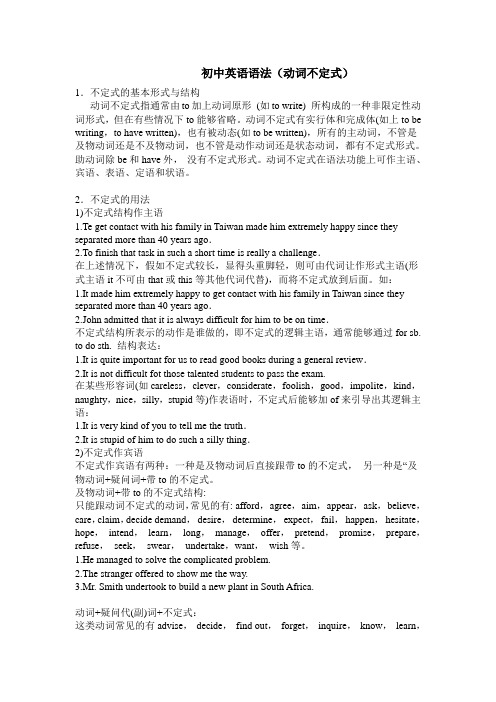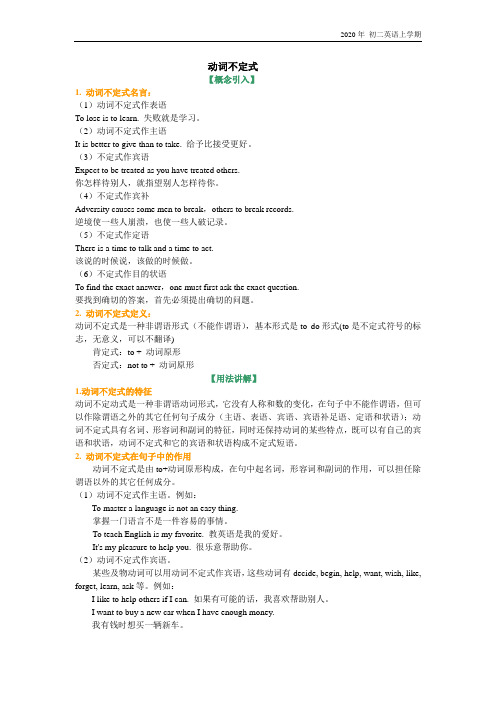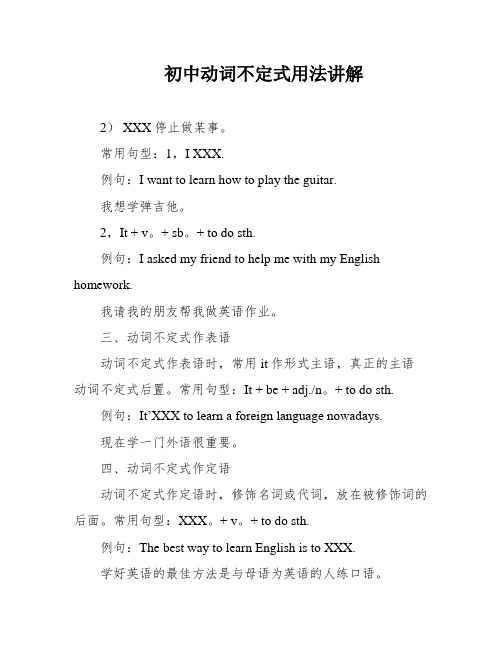动词不定式(基础讲解)
- 格式:doc
- 大小:26.50 KB
- 文档页数:3

动词不定式不定式具有动词的性质,在句中有自己的宾语,并可被状语所修饰。
同时还具有名词、形容词、和副词的性质,在句中可作主语、表语、宾语、宾语补足语、定语、状语等成分。
一作主语1不定式可做主语To hesitate means failure犹豫不决就意味着失败To become a good teacher was my hope.2经常把it放在句首做形式主语,而把真正主语(不定式)放在句末It is very difficult to solve this problem.二作表语不定式可做表语,说明或解释主语的内容Our purpose is to finish the job in the three weeks.三不定式作宾语The children refused to listen to me1有些动词常跟不定式做宾语:agree,decline,refuse,offer,promise,choose,decide,determine,attempt,intend,manage,fail,ask,hope,want,expect,long,wish,tend,desire,seek,claim,pl an,prepare,learn,volunteer,pretend,dare,afford,arrange,beg,demand,happen,bear,hesitate,prefer,strive,threaten等2如果动词后有不定式做宾语而后又跟宾补,这时要用it做形式宾语,而将不定式放到补语后I find it difficult to solve this problem.四不定式作宾补1有些动词后常跟不定式做宾补My parents won’t allow me to stay out late这些动词有:advise,command,force,allow,encourage,instruct,ask,entitle,beg,expect,invite,compel,forbid,like,mean,tempt,oblige,remind,urge,order,want,permi t,wish等2在某些动词短语如rely on,depend on ,wait for等后面,也可跟不定式做补语You can’t depend on him to come punctually.3在think,consider,believe ,find,feel,know,declare,guess,prove,suppose,imagine,judge等词后面,常跟to be+adj/n,但to be常常省略She believes him( to be )honest4hope,demand,suggest等动词后面不可接动词不定式做宾补He hoped his sister to lend him a hand (F)He hoped that his sister would lend him a hand (T)五不定式做定语1不定式用在the first,the second,the last,the next,the only,等短语后面以及形容词最高级修饰的名词后做定语He was the first to arrive2 不定式做定语与被修饰的中心词之间常表现为动宾关系,如果不定式是不及物动词或不定式本身已有宾语,其后应该有必要的介词。


动词不定式的用法概念:动词不定式由to+动词原形构成。
这里的to是不定式标志,没有词义。
不定式具有名词、形容词或副词的某些语法功能,又有动词的时态和语态的特点及作用。
可以做主语、宾语、宾语补足语、表语、定语、状语。
一、作主语动词不定式作主语时,句子的谓语动词常用单数,其位置有以下两种:(1)把不定式置于句首。
如:To get there by bike will take us half an hour.(2)用it作形式主语,把真正的主语不定式置于句后,常用于下列句式中。
如:①It+be+名词+to doIt's our duty to take good care of the old.②It takes sb+some time+to doHow long did it take you to finish the work③It+be+形容词+for sb+to doIt is difficult for us to finish writing the composition in a quarter of an hour.在句型③中,常用表示客观情况的形容词,如:easy, difficult, hard, important, possible, impossible, comfortable, necessary, better;the first, the next, the last, the best, too much, too little, not enough④It+be+形容词+of sb+to doIt is stupid of you to write down everything the teacher says.在句型④中,常用careless,clever,good,foolish,honest,kind,lazy,nice,right,silly,stupid,wise rude, clever, foolish, thoughtful, thoughtless(欠考虑的;不考虑的), brave, considerate(考虑周到的), selfish(自私的)等表示赞扬或批评的词。

初中动词不定用法讲解动词不定式是初中英语语法中的一个重要知识点,对于同学们来说,掌握好动词不定式的用法对于提高英语语言能力有着至关重要的作用。
下面我们就来详细讲解一下初中阶段动词不定式的用法。
一、动词不定式的构成动词不定式的基本形式是“to +动词原形”,其中“to”是动词不定式的符号,没有实际意义。
例如:“to study”(学习)、“to play”(玩耍)。
需要注意的是,在一些情况下,动词不定式符号“to”可以省略。
常见的有以下几种情况:1、使役动词 let、make、have 后接宾语补足语时,省略“to”。
例如:“Let him go”(让他走。
)“The boss made the workers work long hours”(老板让工人们长时间工作。
)2、感官动词see、hear、watch、notice、feel 等后接宾语补足语时,省略“to”。
例如:“I saw him enter the room”(我看见他进了房间。
)二、动词不定式的句法功能1、作主语动词不定式作主语时,通常被视为单数主语。
为了避免句子头重脚轻,常用 it 作形式主语,而将真正的主语动词不定式后置。
例如:“Tolearn English well is not easy”(学好英语不容易。
)这句话可以改写为:“It is not easy to learn English well”2、作宾语一些动词后面常接动词不定式作宾语,常见的有want、hope、wish、decide、plan、expect 等。
例如:“I want to go home”(我想回家。
)“She decides to study harder”(她决定更努力学习。
)3、作宾语补足语某些动词如 ask、tell、want、allow、encourage 等后面常接带“to”的动词不定式作宾语补足语。
例如:“My mother asks me to clean the room”(我妈妈叫我打扫房间。

动词不定式1、不定式的时态和语态:一般式:完成式:进行式:不定式的一般式表示的动作与谓语动词表示的动作一般没有时间先后顺序。
不定式的完成式表示额动作一般发生在谓语动词之前,强调动作的先后顺序。
不定式的进行式表示的动作一般与谓语动词同时进行。
翻译下列句子:1)I hope to finish reading the book again.2) You appear to have travelled quite a lot.3) It’s nice to be sitting here with you.4) I am v ery happy to be praised.5) It is impossible for him to be appointed.2、不定式的句法功能1)作主语To succeed calls for hard work.(不定式在句中作主语相当于名词或代词。
)It seemed selfish of him not to give them anything. (不定式作主语往往用形式主语it 代替)It’s difficult for us to finish the work in a week.2)作宾语不定式一般作动词的宾语,不直接作介词的宾语,但“疑问词+不定式”结构可以作介词的宾语。
如:Y our father has at last decided to quit smoking.Talk with friends about where to shop.只接to do 作宾语的常见动词有:afford, agree, arrange, ask, care, choose, decide, demand, determine, expect, help, hope, plan, hesitate, long, manage, offer, prepare, refuse, pretend, promise, want, intend ,prefer3)作表语,可以表示主语的具体内容,目的。

动词不定式用法一、动词不定式的基本形式“不定式符号to+动词原形”,有时可以不带to。
动词不定式没有人称和数的变化。
在句中不能单独作谓语,但仍保留动词的特性,可以有自己的宾语、状语等。
动词不定式同它的宾语和状语一起构成不定式短语。
例如:to sell flowers in the street 在街上卖花to speak in the classroom 在教室里讲话二、动词不定式的语法功能动词不定式具有名词、形容词和副词的特征,可以作句子的主语、表语、宾语、宾语补足语、定语和状语(一)、作主语:动词不定式作主语可位于句首。
例如:To learn a skill is very important for everyone in today's society.也可使用it作形式主语,而将其置于句末。
例如:It is necessary for young students to learn a foreign language.动词不定式作主语的常用句型有:1. It is+adj./ n. (+for sb./sth.) +to do sth.用于此句型的形容词有:easy, hard, difficult, possible, important, impossible, necessary, good, bad, exciting, interesting, surprising等。
例如:It is interesting to play this game.It is necessary for you to change your job.It was impossible for them to complete the task in such a short time.考例1:Is ____ possible to fly to the moon in a spaceship?A. nowB. manC. thatD. it用于此句型的名词有:pity, shame, pleasure, one’s duty, one’s&sb’job, fun, joy, good manners, bad manners等。

初中英语语法(动词不定式)1.不定式的基本形式与结构动词不定式指通常由to加上动词原形(如to write) 所构成的一种非限定性动词形式,但在有些情况下to能够省略。
动词不定式有实行体和完成体(如上to be writing,to have written),也有被动态(如to be written),所有的主动词,不管是及物动词还是不及物动词,也不管是动作动词还是状态动词,都有不定式形式。
助动词除be和have外,没有不定式形式。
动词不定式在语法功能上可作主语、宾语、表语、定语和状语。
2.不定式的用法1)不定式结构作主语1.Te get contact with his family in Taiwan made him extremely happy since they separated more than 40 years ago.2.To finish that task in such a short time is really a challenge.在上述情况下,假如不定式较长,显得头重脚轻,则可由代词让作形式主语(形式主语it不可由that或this等其他代词代替),而将不定式放到后面。
如:1.It made him extremely happy to get contact with his family in Taiwan since they separated more than 40 years ago.2.John admitted that it is always difficult for him to be on time.不定式结构所表示的动作是谁做的,即不定式的逻辑主语,通常能够通过for sb. to do sth. 结构表达:1.It is quite important for us to read good books during a general review.2.It is not difficult fot those talented students to pass the exam.在某些形容词(如careless,clever,considerate,foolish,good,impolite,kind,naughty,nice,silly,stupid等)作表语时,不定式后能够加of来引导出其逻辑主语:1.It is very kind of you to tell me the truth.2.It is stupid of him to do such a silly thing.2)不定式作宾语不定式作宾语有两种:一种是及物动词后直接跟带to的不定式,另一种是“及物动词+疑问词+带to的不定式。

动词不定式【概念引入】1. 动词不定式名言:(1)动词不定式作表语To lose is to learn. 失败就是学习。
(2)动词不定式作主语It is better to give than to take. 给予比接受更好。
(3)不定式作宾语Expect to be treated as you have treated others.你怎样待别人,就指望别人怎样待你。
(4)不定式作宾补Adversity causes some men to break,others to break records.逆境使一些人崩溃,也使一些人破记录。
(5)不定式作定语There is a time to talk and a time to act.该说的时候说,该做的时候做。
(6)不定式作目的状语To find the exact answer,one must first ask the exact question.要找到确切的答案,首先必须提出确切的问题。
2. 动词不定式定义:动词不定式是一种非谓语形式(不能作谓语),基本形式是to do形式(to是不定式符号的标志,无意义,可以不翻译)肯定式:to + 动词原形否定式:not to + 动词原形【用法讲解】1.动词不定式的特征动词不定动式是一种非谓语动词形式,它没有人称和数的变化,在句子中不能作谓语,但可以作除谓语之外的其它任何句子成分(主语、表语、宾语、宾语补足语、定语和状语);动词不定式具有名词、形容词和副词的特征,同时还保持动词的某些特点,既可以有自己的宾语和状语,动词不定式和它的宾语和状语构成不定式短语。
2. 动词不定式在句子中的作用动词不定式是由to+动词原形构成,在句中起名词,形容词和副词的作用,可以担任除谓语以外的其它任何成分。
(1)动词不定式作主语。
例如:To master a language is not an easy thing.掌握一门语言不是一件容易的事情。

动词不定式用法讲解1、构成及特征2、动词不定式(infinitive)是动词的一种非限定形式,即非谓语动词形式,它有两种形式:一种是“to+动词原形”构成(to-infinitive);另一种是不带to的不定式,即动词原形(bare-infinitive)。
所有行为动词都有不定式形式,其否定式是在不定式前加not。
动词不定式(或不定式短语)没有人称和数的变化,在句子中不能作谓语。
动词不定式仍保留有动词的特点:3、(1)可以有时式和语态的变化,也可以有自己的宾语或状语,它们一起构成了不定式短语。
4、Hetriedtoworkouttheprobleminfiveminutes.他试图在五分钟之内算出这道题。
(带宾语和状语)5、Thefactorytobebuiltherenextyearisacarfactory.明年在这里建的工厂是一家汽车制造厂。
(有语态的变化)6、(2)动词不定式还具有名词、形容词和副词的特征,在句中可以作主语、宾语、表语、补语、定语、状语等成分。
7、HewantstostudyEnglish.他想学英语。
(tostudyEnglish在句中作want的宾语,而tostudy又有自己的宾语English,tostudy和English一起构成了不定式短语。
)8、Nevertooffendanyoneishisprinciple.不得罪人是他的原则。
(不定式作主语)9、注意:不定式在许多场合具有情态意义。
作主语时,相当于一个带有情态动词的主语从句;作宾语时,相当于一个带有情态动词的宾语从句;作定语时,相当于一个带有情态动词的定语从句;作目的状语时,相当于sothat或inorderthat引导的目的状语从句。
10、Itisrightforhertosayso.(=Itisrightthatsheshouldsayso.)她这样说是对的。
11、Hehasalotofworktodo.(=…thatheshoulddo)他有很多工作要做。

动词不定式【概念引入】1. 动词不定式名言:(1)动词不定式作表语To lose is to learn. 失败就是学习。
(2)动词不定式作主语It is better to give than to take. 给予比接受更好。
(3)不定式作宾语Expect to be treated as you have treated others.你怎样待别人,就指望别人怎样待你。
(4)不定式作宾补Adversity causes some men to break,others to break records.逆境使一些人崩溃,也使一些人破记录。
(5)不定式作定语There is a time to talk and a time to act.该说的时候说,该做的时候做。
(6)不定式作目的状语To find the exact answer,one must first ask the exact question.要找到确切的答案,首先必须提出确切的问题。
2. 动词不定式定义:动词不定式是一种非谓语形式(不能作谓语),基本形式是to do形式(to是不定式符号的标志,无意义,可以不翻译)肯定式:to + 动词原形否定式:not to + 动词原形【用法讲解】1.动词不定式的特征动词不定动式是一种非谓语动词形式,它没有人称和数的变化,在句子中不能作谓语,但可以作除谓语之外的其它任何句子成分(主语、表语、宾语、宾语补足语、定语和状语);动词不定式具有名词、形容词和副词的特征,同时还保持动词的某些特点,既可以有自己的宾语和状语,动词不定式和它的宾语和状语构成不定式短语。
2. 动词不定式在句子中的作用动词不定式是由to+动词原形构成,在句中起名词,形容词和副词的作用,可以担任除谓语以外的其它任何成分。
(1)动词不定式作主语。
例如:To master a language is not an easy thing.掌握一门语言不是一件容易的事情。

(完整版)动词的非谓语动词形式讲解动词的非谓语动词形式讲解(完整版)非谓语动词指的是不具备人称和数的特征,不能独立做谓语,而需要与其他词语搭配使用的动词形式。
中文的非谓语动词形式主要有动词不定式、动名词和分词。
以下是对这三种非谓语动词形式的详细讲解:1. 动词不定式(Infinitive)动词不定式是表示动作或状态的一种形式,一般由动词原形前加上"to"构成。
动词不定式在句中可以担任主语、宾语、表语、定语、状语等成分。
示例:- 主语:To travel is my dream.(旅行是我的梦想。
)To travel is my dream.(旅行是我的梦想。
)- 宾语:I want to learn Chinese.(我想学中文。
)to learn Chinese.(我想学中文。
)- 表语:His hobby is to play the piano.(他的爱好是弹钢琴。
)to play the piano.(他的爱好是弹钢琴。
)- 定语:She needs a place to live.(她需要一个住的地方。
)to live.(她需要一个住的地方。
)- 状语:I went there to see the exhibition.(我去那里看展览。
)to see the exhibition.(我去那里看展览。
)2. 动名词(Gerund)动名词是动词的一种形式,以-ing结尾表示动作或状态,相当于名词,可以作为主语、宾语、表语、定语、状语等成分。
示例:- 主语:Swimming is good for health.(游泳对健康有益。
)Swimming is good for health.(游泳对健康有益。
)- 宾语:He enjoys reading books.(他喜欢读书。
)reading books.(他喜欢读书。
)- 表语:His favorite activity is singing.(他最喜欢的活动是唱歌。

不定时讲解一. 动词不定式各种形式有:一般式、完成式、不定式的进行式、不定式的完成进行式、不定式一般式和完成式的被动语态。
1.一般式:表示的动作通常与主要的谓语动作同时或几乎同时发生,或是在它之后发生。
to do(主动)to be done(被动)2.进行式:表示谓语的动作或情况发生时,不定式表示的动作正在进行。
to be doing(主动)3. 完成式:表示不定式的动作发生在谓语动作之前。
to have done (主动)to have been done(被动)I’m sorry to have done that fool thing.4. 完成进行式:表示不定式的动作在谓语动作之前发生并一直进行着。
to have been doing(主动)以下几种情况用不定式的主动形式表示被动意义:1. 在某些静态形容词后作状语的不定式:如easy ,hard ,difficult ,tiresome ,good ,heavy ,interesting 等。
2. 当不定式的动作与所修饰的名词是逻辑上的动宾关系时,可以用主动表示被动。
3. 在too … to 或enough to 结构中,不定式主动表被动。
不定式的否定式不定式的否定形式是在不定式前加否定词not 或never 等。
二. 不定式短语1. 疑问词+ 不定式在tell ,show ,teach ,find out ,decide ,discuss ,learn ,ask ,advise ,remember ,know 等动词后常用“疑问词+ 不定式”这一结构作其定语。
2. of/ for sb to do当不定式作主语时,可以有自己的逻辑主语,指明动作的执行者。
常常使用for 来引出不定式的逻辑主语,但当和不定式搭配的形容词是表示主语的品行、性格特征和行为表现时,需要用of 来代替for ,引出其逻辑主语,使用of 的此类形容词多具有感情色彩。

动词不定式用法讲解------------------------------------------------------------精品文档-------------------------------------------------------- 动词不定式用法小结动词不定式用法小结动词不定式是一种非谓语动词形式,其结构为“to+动词原形”,其中to不是介词,而是动词不定式的符号,称为小品词,动词不定式没有人称和数的变化。
动词不定式和其后面的名词等构成不定式短语,在句子中可以用作主语、表语、宾语、补足语、定语、状语等。
一. 作主语例如:To be a doctor is hard.做医生很难。
To learn English well is not easy.学好英语不容易。
动词不定式(短语)作主语时,为了避免句子的头重脚轻,可以用“it”作形式主语,而把真正的主语--动词不定式(短语)放在句子的后部。
例如上面的句子可以表示为:It is hard to be a doctor.It is not easy to learn English well. 再如:It's important to plant trees in spring.如果动词不定式的动作是谁做的,可以在动词不定式前面加一个由介词for 引导的短语,称为不定式的复合结构。
例:It's good for us to read English aloud in the morning.对我们来说每天早晨大声读英语是很有益的。
It is important for students to use English every day.对学生来说每天使用英语是很重要的。
二. 作表语:动词不定式(短语)作表语常用于系词be的后面。
例:His work is to drive a car.他的工作是开车。
My job is to feed animals.我的工作是饲养动物。

中考英语动词不定式及其用法讲解+练习1.动词不定式的基本概念:动词不定式的基本形式是“to+动词原形”,有时可以不带to。
动词不定式没有人称和数的变化,在句中不能做谓语,但可以有自己的宾语和状语。
动词不定式跟它的宾语和状语构成了不定式短语,例如:to read the book, to speak at the meeting等。
2.动词不定式的用法:动词不定式具有名词,形容词和副词的特性,因此可在句中作主语,表语,宾语,宾语补足语,状语和定语。
句子用法:作主语:eg:1)To take part in sports is important.2)To see is to believe.动词不定式做主语时常常由it来代替它,做形式主语,而动词不定式放在句末。
eg: It’s great to see you again.It is important to learn English well.It was rewarding to take part in this exchange programmeIt will take us a month to go on study trip to New York.It is necessary for governments to control the population growth.做表语:eg:The best way is to pratice.My dream is either to be a diplomat or to be a teacher of English .A popular use of the computer is to send a e-mail.Her wish is to become a famous star.The best way is to read the play before you see it.做宾语:eg: We are talking about how to solve the problem.I think it not difficult to keep reading English every morning.做宾补:eg: We all expect him to win the contest.Our teacher told us to listen carefully in class.注意:感官动词,或使役动词+宾语+无to的不定式Is Jack in the library ?Maybe I saw him go out with some books just now.Let those in need understand that we will go all out to help them.做定语:Liu Yang is the Chinese woman astronaut to enter the space.You are the last one to win the price.In the future , human will have less work to do.Why don’t you go out to play Rose?I’m afraid I can’t . I have a lot of homework to do.做状语:动词不定式做状语可以修饰动词,一般在句中做原因,目的和结果状语,动词不定式做状语可单独放在句首,句中或句末。

初中动词不定式用法讲解2) XXX停止做某事。
常用句型:1,I XXX.例句:I want to learn how to play the guitar.我想学弹吉他。
2,It + v。
+ sb。
+ to do sth.例句:I asked my friend to help me with my English homework.我请我的朋友帮我做英语作业。
三、动词不定式作表语动词不定式作表语时,常用it作形式主语,真正的主语动词不定式后置。
常用句型:It + be + adj./n。
+ to do sth.例句:It’XXX to learn a foreign language nowadays.现在学一门外语很重要。
四、动词不定式作定语动词不定式作定语时,修饰名词或代词,放在被修饰词的后面。
常用句型:XXX。
+ v。
+ to do sth.例句:The best way to learn English is to XXX.学好英语的最佳方法是与母语为英语的人练口语。
五、动词不定式作状语动词不定式作状语时,修饰动词、形容词、副词等。
常用句型:v./adj./adv。
+ to do sth.例句:XXX up early to catch the first train to the city.他早起赶第一班去城市的火车。
doing something when you are not interested in it anymore。
If you finish one task。
go on to the next one。
Remember to do things that you have not done yet。
and et about things that you have already done。
When XXX attributive。
XXX intransitive verb。

动词不定式的用法解说一、动词不定式:组成:to+ 动词原形(to不过不定式符号,没存心义)动词不定式作主语较长时,常用it 作形式主语,而将真实的主语放在句末。
+is/was+ 形容词+(forsb.)+ 动词不定式TolearnEnglishwell isuseful.=It ’suseful tolearnEnglishwell. 学好英语是实用的。
Toprotectenvironment isimportantforus.=It’simportant forus toprotectenvironment. 关于我们来说保护环境是很重要的。
2.Itis/was+kind/good/nice/clever+ofsb.+ 动词不定式It’sverykindofyou tohelpme. 你帮助我真是太好啦。
It’sverycleverofyou todolikethat . 你那样做真的太聪慧啦。
3.It takes(took,will take)sb.sometimetodosomething.(做某事花销某人时间 )isagoodideatodosth.作宾语常有的跟不定式作宾语的动词有:wanttodosth.decidetodosth.hopetodosth.plantodosth.offertodosth.agreetodosth.learntodosth trytodosth prefertodosthpromise todosth.needto dosth.expect todosth.2.主语+find/think+it+形容词+(forsb.)+todoIfindi teasytoreadEnglisheveryday.我发现每日读英语和简单的。
Hefelt ithardtosleep.他感觉很难入眠。
Ithinkitveryint erestingtolearnEnglish.我以为学英语很风趣。

动词不定式一、不定式的构成及变形动词不定式是由不定式符号to+动词原形构成,在某些情况下to也可省略。
⒈不定式的一般式不定式的一般式表示的动作通常与谓语的动作同时或几乎同时发生,或是在它之后发生。
如:He appears to be very happy.(同时发生)To catch the train, we'd better hurry to the station by taxi.(to catch the train发生在hurry to the station之后)⒉不定式的进行式不定式的进行式表示正在进行的或与谓语动词同时发生的动作。
如:It happened to be raining when I got there.⒊不定式的完成式不定式的完成式表示的动作在谓语表示的动作之前发生。
如:I'm sorry to have lost your key.⒋不定式的完成进行式不定式的完成进行式表示的动作在谓语之前发生并且一直进行着。
如:He was said to have been living in London for twenty years.不定式的时态意义:如:He is said to be studying abroad.(不定式的进行式表示动作正在进行)He is said to have studied abroad.(不定式的完成式表示动作已经结束)⒌不定式的被动形式当不定式逻辑上的主语是这个不定式表示的动作的承受者时,不定式一般要用被动形式。
不定式的被动形式根据其与谓语动作发生的先后关系,有一般式和完成时两种。
①一般式to be done如:These are the books to be given out to the students.②完成式to have been done如:The novel is said to have been translated into many languages.⒍不定式的否定形式不定式的否定形式由not或never加不定式构成。
动词不定式
【概念引入】
1. 动词不定式名言:
(1)动词不定式作表语
To lose is to learn. 失败就是学习。
(2)动词不定式作主语
It is better to give than to take. 给予比接受更好。
(3)不定式作宾语
Expect to be treated as you have treated others.
你怎样待别人,就指望别人怎样待你。
(4)不定式作宾补
Adversity causes some men to break,others to break records.
逆境使一些人崩溃,也使一些人破记录。
(5)不定式作定语
There is a time to talk and a time to act.
该说的时候说,该做的时候做。
(6)不定式作目的状语
To find the exact answer,one must first ask the exact question.
要找到确切的答案,首先必须提出确切的问题。
2. 动词不定式定义:
动词不定式是一种非谓语形式(不能作谓语),基本形式是to do形式(to是不定式符号的标志,无意义,可以不翻译)
肯定式:to + 动词原形
否定式:not to + 动词原形
【用法讲解】
1.动词不定式的特征
动词不定动式是一种非谓语动词形式,它没有人称和数的变化,在句子中不能作谓语,但可以作除谓语之外的其它任何句子成分(主语、表语、宾语、宾语补足语、定语和状语);动词不定式具有名词、形容词和副词的特征,同时还保持动词的某些特点,既可以有自己的宾语和状语,动词不定式和它的宾语和状语构成不定式短语。
2. 动词不定式在句子中的作用
动词不定式是由to+动词原形构成,在句中起名词,形容词和副词的作用,可以担任除谓语以外的其它任何成分。
(1)动词不定式作主语。
例如:
To master a language is not an easy thing.
掌握一门语言不是一件容易的事情。
To teach English is my favorite. 教英语是我的爱好。
It's my pleasure to help you. 很乐意帮助你。
(2)动词不定式作宾语。
某些及物动词可以用动词不定式作宾语,这些动词有decide, begin, help, want, wish, like, forget, learn, ask等。
例如:
I like to help others if I can. 如果有可能的话,我喜欢帮助别人。
I want to buy a new car when I have enough money.
我有钱时想买一辆新车。
(3)动词不定式作宾语补足语。
例如:
We expect you to be with us. 我们希望你和我们在一起。
Please ask him to come here quickly. 请叫他快过来。
(4)动词不定式作表语。
例如:
What I should do is to finish the task soon.
我应该做的是赶快完成任务。
The most urgent thing is to find the boy immediately.
当务之急是马上去找孩子。
(5)动词不定式作定语。
例如:
There are many ways to solve the problem.
有许多方法能解决这个问题。
I have something important to tell you.
我有重要的事情要告诉你。
(6)不定式作状语。
例如:
We went to the hospital to see our teacher.
我们去医院看了我们的老师。
She is making a test to get a kind of useful medicine from a Tibet flower.
她在做试验,从一种西藏花中提取某种有用的药物
3.不定式后接特殊疑问词的用法
不定式可以和疑问代词who, what, which及疑问副词when, how, where等连用,构成不定式短语,在句子中作主语、宾语、表语等。
例如:
I don't know what to say. 我不知道说什么。
Can you tell me how to make a paper boat?你能告诉我怎样做一只纸船吗?
I don't know which topic to choose. 我不知道选哪个题目。
Where to stay for the night is a problem. 晚上在哪儿过夜还是个问题。
4.不定式的重要句型
(1)It’s+adj.+for (of)sb. to do sth.
当不定式作主语时,通常用it作为形式主语,而把真正的主语不定式结构后置。
例如:To meet you is a great pleasure. =It is a great pleasure to meet you.
非常高兴见到你。
To plant trees every year is necessary.= It is necessary to plant trees every year.
每年植树是必要的。
这种结构往往还要有一个逻辑主语。
一般使用下面的结构:
1)It is +adj. +of sb.+to do sth.
It is selfish of you to eat the whole birthday cake.
你真是太自私了,吃光了整个蛋糕。
2)It is +adj. + for sb. + to do sth.
It is difficult for me to learn English well.
对我来说学好英语太难了。
【注意】
for和of引导的不定式结构的区别
表语形容词的语义不同是区别for 结构和of 结构的最重要标志。
1)在“It is(was)+adj.+for sb.+to do sth.”的句式中,作表语的形容词大多是表事物性质的静态形容词,如:essential,easy,difficult, important,necessary,possible,hard等等,
这类形容词与for后面的名词(代词)关系不密切,无意义上的主表关系。
例如:It is necessary for us to practise speaking English every day.
每天练习说英语对我们来说是很有必要的。
2)在“It is(was)+adj.+of sb.…”的句式中,作表语的形容词大多是表示人物特征的形容词。
如:brave,careless,careful,clever,cruel,foolish,good,honest,(un)kind noble,polite,right,rude,sweet,silly,stupid,wrong等等。
这些表示人物特征的形容词与of后的名词关系十分密切,有意义上的主表关系。
例如:
It is kind of you(=You are kind)to send me a nice present.
谢谢你送我这么好的礼物。
It was stupid of her(=She was stupid)to make such a mistake.
出这样的错她真是太蠢了。
(2)主语+动词+too+形容词/副词+(for+sb.)+to+动词原形
表示“……太……而不能……”。
例如:
He walked too slowly to catch up with me.
他走得太慢而不能跟上我。
It is too dark in this room for me to read a book.
房间太暗,使我无法看书。
This problem is too difficult for them to settle.
这对他们来说真是一个难解的问题。
(3)主语+动词+……形容词/副词+enough+(for sb.)+to+动词原形表示“……对某人足以……”。
例如:
We need several men strong enough to do the work.
我们需要几个强壮得足以做这件工作的人。
They bought a house large enough for ten persons to live in.
我们买了一栋房子,大得足以供十个人住。
He is competent enough to fill that position.
他足以胜任那职位。
(4)主语+动词+enough+名词+to+动词原形
表示“……对某人足以……”。
例如:
He has enough money (=money enough) to buy a car.
他有足够的钱买一辆汽车。
He hasn’t enough sense to realize his mistakes.
他没有足够的辨别力去认识自己的错误。